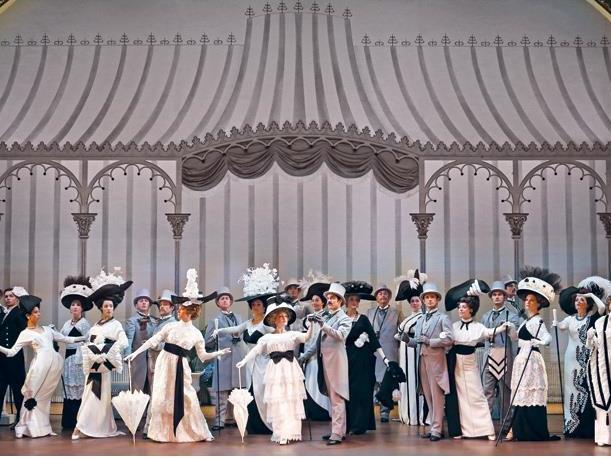Opening night of My Fair Lady. Photograph by Jeff Busby.
I confess to having seen the stage production of My Fair Lady, at the Theatre Royal, Drury Lane in London, which starred Julie Andrews as Eliza, Rex Harrison as Mr. Higgins and Stanley Holloway as the colourfully roguish Alfred Doolittle, Eliza’s Dad. This year’s production superbly and lovingly directed, is a trip down memory lane especially as Andrews, if not on stage, was in the audience as Director.
The production never strayed far from Alan Jay Lerner and Frederick Loewe’s original and the lavish set – rich in period detail – was a replica of Oliver Smith’s original. On its 60th anniversary, My Fair Lady successfully resurrects the original’s zest and doffs its cap at the past.
There were sumptuous costumes and gorgeous theatrical tableaux in the Ascot scene especially. Old school – there were frequent set stages, although managed efficiently and cheered along by musical interludes ably and enthusiastically conducted.
For anyone who has not seen the film which starred Audrey Hepburn and Harrison or the staged musical, the story features a misogynistic, insufferably arrogant Professor of Phonetics who brags one night to an acquaintance Colonel Pickering – as they stroll through London’s Covent Garden – that the only thing that keeps the British class structures intact is a person’s accent.
Eliza Doolittle, an impoverished flower seller in Covent Garden, takes this to heart. Days later, she appears at Higgins’ dwelling and asks if he will teach her how to talk like a lady. Higgins wagers with Pickering that he will do precisely that and Eliza, bathed, schooled and elegantly frocked up stays for weeks as Higgins obsessively irons out Eliza’s contorted, crumpled and creased cockney vowels.
Based on Pygmalion, a play by George Bernard Shaw, it’s an eternally appealing Cinderella story; the words are punchy, humorous, and critical of the great divide in fortunes between Britain’s lower and upper classes. And male attitudes to women are lampooned through the character of Higgins played admirably by Charles Edwards (of Downtown Abbey fame) and love struck Freddy.
Edwards must have poured over Rex Harrison’s recordings of ‘Why Can’t A Woman Be More Like A Man’ and ‘I’ve Grown Accustomed To Her Face’ because at times he seems to channel Rex Harrison. Anne O’ Byrne is brilliant as Eliza, excellent as the flower seller doing it tough and as a confused woman in transition somewhere between her humble past and elevated future. She sang distinctively and conveyed all stages of her diction overhaul and milks the humour. In the famous ‘Ascot’ scene she parrots the phrases mastered under Higgins’ tutelage, ‘The rain in Spain falls mainly on the plain’ and a laughably crisp ‘ How – do – you – do?, until she spies her favourite horse tearing round the track and screams full bore with strangled emphasis, ‘Move your bloomin’ arse.’
‘I Could Have Danced All Night’ and ‘A Room Somewhere’ are convincingly acquitted by O’ Byrne, on the other hand, Livermore’s Doolittle routines, ‘With A Little Bit Of Luck’ and ‘Get Me To The Church’ were a smidgeon understated on opening night and there’s scope for Doolittle’s character to be further fleshed out. Supporting actors Robyn Nevin as Mrs Doolittle had twinkling humour and buckets of gravitas. Tony Llewellyn-Jones is suitably avuncular, doddery and humane in Pickering’s shoes and Deirdre Rubinstein convinces in the tricky role of Mrs Pearce.
Entertaining, funny, full of life, pathos, pleasing to the eye and ear, this is a corker of a crowd pleaser. There’s only one gripe. Eliza should be the one, not Higgins, who says in the closing sentence, ‘Where are my slippers?’
Rating: 4 1/2 stars out of 5
My Fair Lady
Presented by Opera Australia and John Frost
Lyric Theatre
Queensland Performing Arts Centre
Until the 30 April 2017





